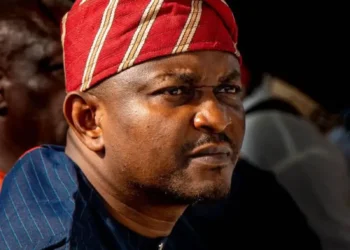

...To get all news updates, Join our WhatsApp Group (Click Here)
Connect with us on Linkedin (Click Here)

President Bola Tinubu on Wednesday revealed that over 40 lawsuits were instituted against his unpopular declaration of a “state of emergency” rule in Rivers State.
The president added in his broadcast that many of the lawsuits are still pending in different courts across the country.


Tinubu disclosed this in the State House release wherein he announced the cessation of the six-month-long state of emergency he imposed on Rivers State in March 2025.
The President said he had no choice but to invoke Section 305 of the 1999 Constitution to suspend Governor Siminalayi Fubara, his deputy, Ngozi Nma Odu, and 31 lawmakers of the Rivers State House of Assembly for six months after what he described as a “total paralysis of governance” in the state.

Quoting directly from the statement, Tinubu said: “You will recall that on 18th March, 2025, I proclaimed a state of emergency in the state. In my proclamation address, I highlighted the reasons for the declaration. The summary of it for context is that there was a total paralysis of governance in Rivers State, which had led to the Governor of Rivers State and the House of Assembly being unable to work together. Critical economic assets of the State, including oil pipelines, were being vandalised.”
He accused the Rivers State legislature of descending into open crisis, adding that the Supreme Court itself had ruled there was no functional government in Rivers State before his intervention.
“It therefore became painfully inevitable that to arrest the drift towards anarchy in Rivers State, I was obligated to invoke the powers conferred on me by Section 305 of the 1999 Constitution, as amended, to proclaim the state of emergency. The Offices of the Governor, Deputy Governor, and elected members of the State House of Assembly were suspended for six months in the first instance.”
Tinubu, however, acknowledged that many Nigerians opposed his decision and dragged him to court.
“I am not unaware that there were a few voices of dissent against the proclamation, which led to their instituting over 40 cases in the courts in Abuja, Port Harcourt, and Yenagoa, to invalidate the declaration. That is the way it should be in a democratic setting. Some cases are still pending in the courts as of today.”
The President justified his action as a necessary step to stop “a total breakdown of public order and public safety.”
But in what appears to be a face-saving retreat, Tinubu declared that the emergency rule had run its course and would end on September 17, 2025, paving the way for Fubara and his deputy to return to office.
“It therefore gives me great pleasure to declare that the emergency in Rivers State of Nigeria shall end with effect from midnight today. The Governor, His Excellency Siminalayi Fubara, the deputy governor, Her Excellency Ngozi Nma Odu, and members of the Rivers State House of Assembly and the speaker, Martins Amaewhule, will resume work in their offices from 18 September 2025.”
The President urged state governments and legislatures nationwide to avoid repeating the political brinkmanship that brought Rivers State to the edge of collapse.
“As a stakeholder in democratic governance, I believe that the need for a harmonious existence and relationship between the executive and the legislature is key to a successful government, whether at the state or national level. The people who voted us into power expect to reap the fruits of democracy. However, that expectation will remain unrealizable in an atmosphere of violence, anarchy, and insecurity borne by misguided political activism and Machiavellian manipulations among the stakeholders.”
Tinubu’s declaration officially brings to an end one of the most controversial federal interventions in state governance in Nigeria’s Fourth Republic.
This intervention still being challenged in court to lay down a proper precedence in the country’s constitutional system.
...To get all news updates, Join our WhatsApp Group (Click Here)
Connect with us on Linkedin (Click Here)










